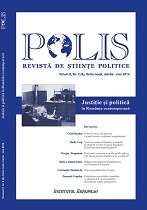Criza geopolitică din Ucraina
The geopolitical crisis in Ukraine
Author(s): Constantin ManolacheSubject(s): Politics / Political Sciences
Published by: Editura Institutul European
Keywords: crisis; Crimea; geopolitics; international organizations; Russian Federation; Ukraine.
Summary/Abstract: The geopolitical crisis in Ukraine represents the effects of changes in the ex-Soviet countries after the collapse of communism in 1990, fleshing the hegemonic security and defence policy of the Russian Federation and the reactions of international organizations (EU, UN, NATO, OSCE) and the great powers, especially the United States. Different historical developments of the eastern and western parts of Ukraine demonstrate a territorial, political, social, cultural and religious division which manifests itself after the collapse of the USSR and Ukraine's independence declaration on 24 August 1991. From a religious point of view, the division is evident in that the western part of Ukraine is predominantly Catholic and the eastern part belongs to the orthodox religion. Instability in Ukraine is accompanied by the danger of disintegration, the threat coming from the inside, and is determined by the economic crisis, the political situation, misunderstandings between political groups and conflicts between the main regions. The western part of the country, represented by Ukrainian nationalists, opts for independence from Moscow, orientation towards the West and integration into Euro-Atlantic structures, while the pro-Russians from the East and South (especially in Crimea Peninsula and Donetsk Basin) want to develop close cooperative relations with the Russian Federation and Ukraine's integration in the economic, political and security of the Commonwealth of Independent States (CIS).
Journal: Polis. Journal of Political Science
- Issue Year: II/2014
- Issue No: 04
- Page Range: 67-84
- Page Count: 18

